

Www.theguardian. The social customer. Peter Ferdinand Drucker has influenced a great deal of my thinking, particularly about management, about organisation, about organisations, about all of business.
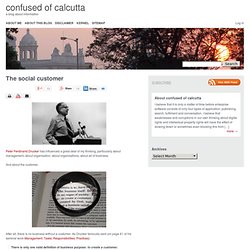
And about the customer. After all, there is no business without a customer. As Drucker famously said (on page 61 of his seminal work Management: Tasks: Responsibilities: Practices): There is only one valid definition of business purpose: to create a customer. His italics, not mine. The purpose of business is to create a customer. A customer. According to the Oxford English Dictionary, the noun “customer” has a number of meanings: One who acquires ownership by long use or possession; a customary holder.An official who collects customs or dues; a custom-house officer.One who “frequents” any place or sale for the sake of purchasing; one who customarily purchases from a particular tradesman; a buyer, purchaser. The Rise of the Social Customer. With the explosion of social media channels, companies need to think about how they can share social media guidelines and best practices with their employees.
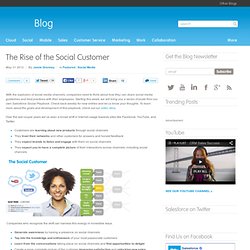
Starting this week, we will bring you a series of posts from our own Salesforce Social Playbook. Check back weekly for new entries and let us know your thoughts. To learn more about the goals and development of this playbook, check out our video story. Over the last couple years we’ve seen a broad shift in Internet usage towards sites like Facebook, YouTube, and Twitter. The Social Media Playbook. Marketers Need to Think Differently in the Facebook Era. When salesforce.com was founded 10 years ago we built our business around the website.
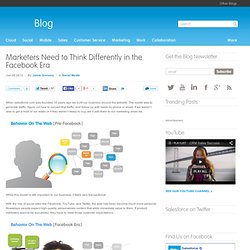
The model was to generate traffic, figure out how to convert that traffic, and follow up with leads by phone or email. If we weren’t able to get a hold of our leads or if they weren’t ready to buy, we’d add them to our marketing email list. While this model is still important to our business, it feels very transactional. With the rise of social sites like Facebook, YouTube, and Twitter, the web has been become much more personal.
Nowadays people expect high-quality, personalized content that adds immediate value to them. Here are a few examples of the new user behaviors have transformed the traditional web campaigns into “always on” marketing: The Website ➜ Content Marketing With the traditional marketing the website is essentially a product brochure. The Stages to Staffing Social Media for Your Organization. Staffing sets the tone for how social media is executed in any company.
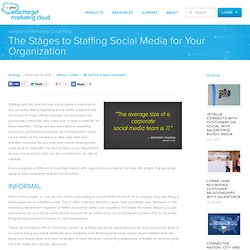
Many beginning social media programs are not driven through official channels, but are started by passionate individuals who make time in their schedules for these activities. Things like job descriptions, reporting structures, performance reviews and compensation plans cause others in the company to take new roles and activities seriously. As you plan your social media growth, make sure to meet with the Human Resources department so your social media skills can be considered in an official capacity. Adoption of Social Media Needs Executive Support. The Marketing Cloud Social Scorecard allows companies to benchmark their social media efforts against the Marketing Cloud Maturity Model across nine important categories.
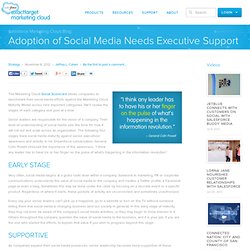
We’ll review the stages of each category one post at a time. Senior leaders are responsible for the vision of a company. Social media adoption – Salesforce Marketing Cloud. 10 Ways Social Media Technologies are Adding Value and Productivity. Social media technologies have touched humanity in a primal way.
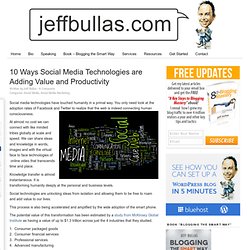
You only need look at the adoption rates of Facebook and Twitter to realize that the web is indeed connecting human consciousness. At almost no cost we can connect with like minded tribes globally at scale and speed. We can share ideas and knowledge in words, images and with the virtual face to face technologies of online video that transcends time and place. Knowledge transfer is almost instantaneous. It is transforming humanity deeply at the personal and business levels.
Neil Young, David Agus and the Social Enterprise. Admit it.
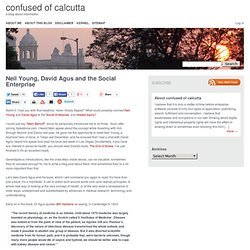
I had you with that headline. Have I finally flipped? What could possibly connect Neil Young and David Agus to the Social Enterprise, and related topics? I could just say “Marc Benioff”, since he personally introduced me to all three. Soon after joining Salesforce.com, I heard Marc speak about the concept while travelling with him through Munich and Davos last year; he gave me the opportunity to meet Neil Young, a boyhood hero of mine, in Tokyo last December; and he ensured that I had a chat with David Agus, heard him speak and read his book last week in Las Vegas.
Serendipitous introductions, like the ones Marc made above, can be valuable; sometimes they’re valuable enough for me to write a blog post about them. Let’s take David Agus and his book, which I will commend you again to read. Early on in the book, Dr Agus quotes JBS Haldane as saying, in Cambridge in 1923: “The recent history of medicine is as follows. How social enterprise is transforming business - Interview. For many IT managers the word “social” is associated with frivolity, but Peter Coffee, VP and Head of Platform Research at Salesforce.com believes that organisations should not think in terms of social versus serious, or social versus professional, but in terms of social versus anti-social.
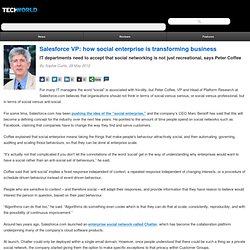
For some time, Salesforce.com has been pushing the idea of the “social enterprise,” and the company's CEO Marc Benioff has said that this will become a defining concept for the industry over the next few years. He pointed to the amount of time people spend on social networks such as Facebook, claiming that companies have to change the way they find and serve customers. Coffee explained that social enterprise means taking the things that make people's behaviour attractively social, and then automating, governing, auditing and scaling those behaviours, so that they can be done at enterprise scale.
#B2B. Social Customer Service. #SocBiz.